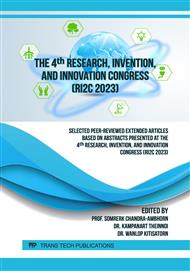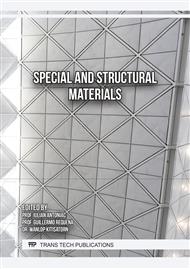p.63
p.75
p.87
p.97
p.103
p.111
p.121
p.131
p.139
Recycling PET Bottles for 3D-Printing Filament: Effect of Chain Extender
Abstract:
This study investigates the effect of a chain extender on the properties of recycled polyethylene terephthalate (rPET) for 3D printing filament. The research focuses on the melt flow index (MFI), mechanical properties, thermal behavior, and crystallinity of rPET blends with varying chain extender concentrations. MFI analysis reveals that the viscosity of rPET is influenced by the grade and sources of the PET bottles. The addition of the chain extender decreases MFI, indicating increased viscosity. Mechanical testing shows a slight decrease in impact strength with increasing chain extender concentration, suggesting the presence of limitations or constraints within the material. Thermal analysis demonstrates that the chain extender elevates the glass transition temperature (Tg) and melting temperature (Tm) of rPET, indicating enhanced rigidity and thermal resistance. However, the crystallinity (Xc) decreases as the chain extender disrupts the regular packing of polymer chains within the crystalline regions. These findings provide valuable insights into the influence of the chain extender on the properties of rPET for 3D printing filament. The research contributes to the development of sustainable manufacturing practices and promotes the utilization of recycled materials in additive manufacturing applications, furthering the goals of the circular economy and environmental sustainability.
Info:
Periodical:
Pages:
103-108
DOI:
Citation:
Online since:
October 2023
Price:
Сopyright:
© 2023 Trans Tech Publications Ltd. All Rights Reserved
Share:
Citation:



